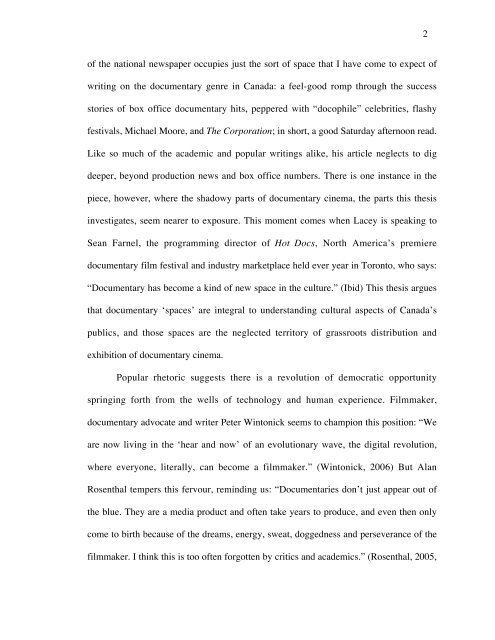The Spaces Between Grassroots Documentary ... - Ezra Winton
The Spaces Between Grassroots Documentary ... - Ezra Winton
The Spaces Between Grassroots Documentary ... - Ezra Winton
You also want an ePaper? Increase the reach of your titles
YUMPU automatically turns print PDFs into web optimized ePapers that Google loves.
of the national newspaper occupies just the sort of space that I have come to expect of<br />
writing on the documentary genre in Canada: a feel-good romp through the success<br />
stories of box office documentary hits, peppered with “docophile” celebrities, flashy<br />
festivals, Michael Moore, and <strong>The</strong> Corporation; in short, a good Saturday afternoon read.<br />
Like so much of the academic and popular writings alike, his article neglects to dig<br />
deeper, beyond production news and box office numbers. <strong>The</strong>re is one instance in the<br />
piece, however, where the shadowy parts of documentary cinema, the parts this thesis<br />
investigates, seem nearer to exposure. This moment comes when Lacey is speaking to<br />
Sean Farnel, the programming director of Hot Docs, North America’s premiere<br />
documentary film festival and industry marketplace held ever year in Toronto, who says:<br />
“<strong>Documentary</strong> has become a kind of new space in the culture.” (Ibid) This thesis argues<br />
that documentary ‘spaces’ are integral to understanding cultural aspects of Canada’s<br />
publics, and those spaces are the neglected territory of grassroots distribution and<br />
exhibition of documentary cinema.<br />
Popular rhetoric suggests there is a revolution of democratic opportunity<br />
springing forth from the wells of technology and human experience. Filmmaker,<br />
documentary advocate and writer Peter <strong>Winton</strong>ick seems to champion this position: “We<br />
are now living in the ‘hear and now’ of an evolutionary wave, the digital revolution,<br />
where everyone, literally, can become a filmmaker.” (<strong>Winton</strong>ick, 2006) But Alan<br />
Rosenthal tempers this fervour, reminding us: “Documentaries don’t just appear out of<br />
the blue. <strong>The</strong>y are a media product and often take years to produce, and even then only<br />
come to birth because of the dreams, energy, sweat, doggedness and perseverance of the<br />
filmmaker. I think this is too often forgotten by critics and academics.” (Rosenthal, 2005,<br />
2


